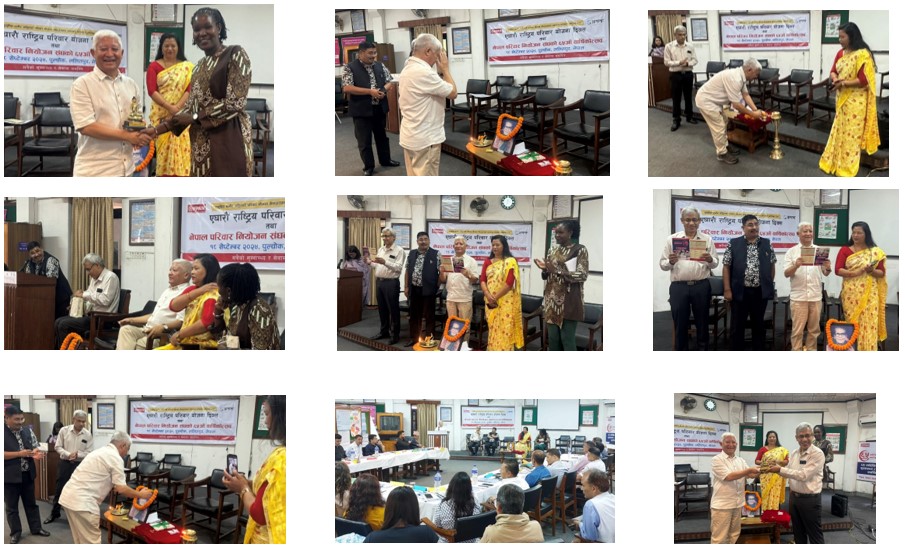Celebrated 11th National Family Planning Day and 65th Family Planning Association of Nepal Day
Back to News
Celebrated 11th National Family Planning Day and 65th Family Planning Association of Nepal Day
Back to News
Every year, Family Planning Association of Nepal (FPAN) celebrates its foundation day on 18 September as FPAN day. FPAN was established on 18 September 1959, as the first Volunteer-based NGO to work for advocacy of, increasing awareness on and increasing access to family planning (FP) in Nepal. It has started FP programs even before the Nepal government launched its own FP and Maternal and Child Health Project in 1969. With the leadership of FPAN for advocacy to celebrate National Family Planning Day, the Family Health Division of Ministry of Health also started to celebrate the National Family Planning Day on the same day when FPAN was established from 18 September 2014. This year, the Family Welfare Division of Ministry of Health and Population has set a slogan “Informed Choices of FP Service: Supports to Attain Reproductive Rights’ to mark 11th National Planning Day. With this slogan, FPAN marked its 65th Anniversary and 11th National Family Planning Day at its Head Office, Harihar Bhawan, Pulchowk, Lalitpur, in presence of its Central Committee President Mr. Himalaya Lala Kasajoo, Central Committee Member Ms. Indralaxmi Shrestha, Senior Management Team, Head Office staff team and Branch Managers. The program began with the welcome remarks by Ms. Indralaxmi Shrestha. In her remarks, she highlighted about the importance of FP for Family Management and role of FPAN in increasing access of FP in Nepal.
Central Committee President Mr. Himalaya Lal Kasajoo paid tribute to the Founder of FPAN, late Honorable Minister Dwarikadevi Thakurani, by garlanding her photo. He remarked, despite Ms. Dwarikadevi Thakurani being a lady from remote area of Far-Western region, she was indeed a great visionary leader who has played invaluable role in introducing and expanding FP education, information, and services in Nepal. He added, because of expansion of the FP program in leadership of Ms. Thakurani and FPAN, and support of the government, we have been able to reach out more than 3.6 million people in 2023 and help them to get accessible frontiers of FP information and contraceptives.
On the occasion, Executive Director of FPAN, Dr. Prabin Shakya remarked that FPAN, as a first NGO to work for advocacy of, increasing awareness on and increasing access of FP, has made invaluable contribution in increasing accessibility of FP education, information and services, and in supporting the government to develop FP policies, program and strategies. He added, FPAN had started FP movement in Nepal with birth control approach promoting the message “Small Family, Happy Family”. But to align with the changed context, it has expanded its scope of work moving beyond the FP to Sexual and Reproductive Health (SRH) and Rights, adopting right-based approach placing people at center of development, to support the basic right of everyone to decide freely and responsibly the number and spacing of their children. FPAN has collaborated with different external donors and partners and has been a member association of IPPF since 1969. This has made FPAN a locally owned, globally connected civil society, enabling it to advocate for, to increase awareness on, and to provide a wide range of SRH service and rights (SRHR). Now, it provides a wide range of FP and SRH services, respecting the rights of everyone to make choices about their sexuality and wellbeing, without any discrimination by gender, age, and socioeconomic status. Also, he added, despite Nepal has made remarkable progress in increasing access to and utilization of FP/SRH services over the last five decades, there is still a high unmet need of contraceptives (21%) among currently married women. So, it is important to increase accessibility of contraceptives across the country, targeting the underserved communities to achieve Nepal’s SDG targets of achieving modern contraceptive prevalence rate of 60%, and to reduce an unmet need of contraceptives to 10%. Moreover, there is still a widespread social norms and beliefs regarding early age at marriage, gender discrimination, resulting in invisible barriers to receive SRH services by women, adolescents and marginalized communities (i.e. poor, people in rural and difficult to reach areas, socially excluded cast, female sex workers, and LGBTIQ), empowerment of women to seek for FP/SRH services independently. He said, FPAN will continue its work adopting the Life Cycle comprehensive approach to ensuring SRH of everyone, elimination of child and forced marriages, and addressing the risks associated with early and unwanted pregnancy, while providing education, information, counselling and services enabling couples to make reproductive decisions based on reliable information. Moreover, FPAN plans to provide high-quality information on FP/RSH through print media, visual media, social media and hotline teleconsultation, and informed choices of FP/RSH services through its static clinics, mobile clinics, and community-based distribution.
In the program, Ms. Edna N. Mokaya, Senior SRH Technical Advisor of IPPF, Humanitarian Program, and Dr. Ishwor Upadhayay, Senor Trainer, National Heath Training Centre, were also present. On behalf of FPAN, Central Committee President Mr. Himalaya Lal Kasajoo, presented Token of Love to both, honoring their support in ongoing Minimum Initial SRH Service Package for Crisis/Disaster affected people. In the concluding remarks, Mr. Kassajoo added that though FPAN had started its program limiting to birth control in past, because of decline in birth rate and population growth rate changing the demographic situation, FPAN will now focus its programs and activities more on family welfare and management, creating new spaces for informed choices of FP information and services, supporting all to attain their reproductive rights.

